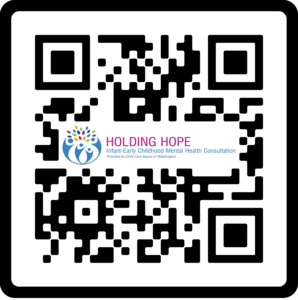

How We Can Help
Holding Hope is a statewide Infant-Early Childhood Mental Health Consultation Service offered through BrightSpark. Our services are based in relationships, and are collaborative and individualized to meet child, family and provider needs in ways that are respectful and responsive. Infant-Early Childhood Mental Health (IECMH) can also be referred to as social and emotional health.
Why Infant-Early Childhood Mental Health Matters
Research shows that IECMH consulting can help with:
-
Decreasing challenging behaviors and prevent expulsion.
-
Promoting healthy social and emotional development.
-
Strengthening relationships among staff, children and families.
-
Reducing teacher stress and decrease staff turnover.
What Does Infant-Early Childhood Mental Health Consultation Look Like?

Our consultants are available to serve children, families, and providers across Washington State – even those outside of King and Pierce counties! They can help by offering services such as:
-
Reflective consultation with teachers, administrators, staff and families.
-
Supporting providers and families in understanding and responding to children’s challenging behaviors.
-
Classroom observation, both virtually and onsite as needed.
-
Developing individual support plans and effective strategies for meeting children’s and families’ needs.
-
Resources and referrals for children, families and staff.
-
Trainings for staff, administrators and coaches on topics such as Trauma-Informed Practice, Understanding and Managing Challenging Behavior, Expulsion Prevention and more.

Scan the QR code to the left to fill out a request form on your mobile device, or click on the button below to submit the form on a desktop device. After your request is submitted, it will be reviewed by our consultants and our team will get in touch with you.
Positive relationships between children and adults are critical to creating the brain architecture to grow healthy social, emotional, and intellectual development. This is why BrightSpark Early Learning Services is offering trainings on best practices for supporting mental health through a trauma-informed lens.
Trauma-informed care recognizes how traumatic experiences can impact the functionality and development of the brain, and is designed to address this trauma and support healing without causing further harm to vulnerable individuals. A trauma informed approach involves realizing the wide prevalence of trauma; recognizing how trauma affects individuals, families, generations, and communities, and responding by putting this knowledge in practice.
Goals of trauma informed care include:
-
Realize the widespread impact of trauma and understand paths for recovery
-
Recognize the signs and symptoms of trauma in patients, families, and staff
-
Integrate knowledge about trauma into policies, procedures, and practices
-
Actively avoid re-traumatization